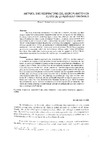Please use this identifier to cite or link to this item:
https://accedacris.ulpgc.es/jspui/handle/10553/74587
| Title: | Metabolismo respiratorio del microplancton en aguas de la península antártica | Authors: | Montero, María F. Arístegui, Javier |
UNESCO Clasification: | 251001 Oceanografía biológica | Keywords: | Antarctica Bransfield Strait Carbon balances Microplankton respiration Spatial variability |
Issue Date: | 1996 | Publisher: | Comisión Interministerial de Ciencia y Tecnología, CICYT | Conference: | V Simposio Español de Estudios Antárticos | Abstract: | We have studied the respiration of microplankton (<200mm), measured as direct
oxygen consumption and electron transport system activity, during two cruises carried out
in coastal waters of the Antarctic Peninsula, in December, 1991 and January, 1993. 00th
types of estimations were closely correlated. Therefore, enzymatic measurements were
transformed to actual respiration rates. Carbon balances performed in surface waters (0-
100 m) of the Bransfield Strait showed that cornmunity (microplankton) respiration represented
a greater loss of carbon, as previously considered in recently published carbon flow
models from the area. However, these losses were not constant. The highests respiratory
activities were associated with frontal areas between different water masses of the Bransfield
Strait. Our results show that it is necessary to study the spatial variability of the microplankton
respiration to understand the carbon cycle in coastal Antarctic waters. Hemos estudiado la respiración del microplancton (<200mm), medida como consumo directo de oxígeno y como actividad respiratoria del sistema de transporte de electrones, durante dos campañas llevadas a cabo en aguas de la Península Antártica en Diciembre, 1991 y Enero, 1993. Ambos tipos de estimaciones mostraron una buena correlación, por lo que las medidas enzimáticas pudieron ser transformadas a tasas reales de respiración. Los baiances de carbono iievados a cabo en aguas superficiaiec (6-1 GG m), en diferentes estaciones del Estrecho de Bransfield, mostraron que la respiración constituía una pérdida superior a lo que se ha venido considerando en modelos de carbono publicados recientemente sobre este área. Sin embargo, las pérdidas por respiración no eran constantes. En el Estrecho de Bransfield, las actividades respiratorias más elevadas se encontraron asociadas a las áreas de frente entre diferentes masas de agua. Nuestros resultados demuestran que es necesario estudiar la variabilidad espacial del metabolismo respiratorio del microplancton para poder realizar un balance acertado del ciclo del carbono en aguas costeras de la Antártida. |
URI: | https://accedacris.ulpgc.es/handle/10553/74587 | Source: | V Simposio Español de Estudios Antárticos / Edited by J. Cacho and D. Serrat, p. 39-53 |
| Appears in Collections: | Actas de congresos |
Page view(s)
252
checked on Jan 15, 2026
Download(s)
102
checked on Jan 15, 2026
Google ScholarTM
Check
Share
Export metadata
Items in accedaCRIS are protected by copyright, with all rights reserved, unless otherwise indicated.
